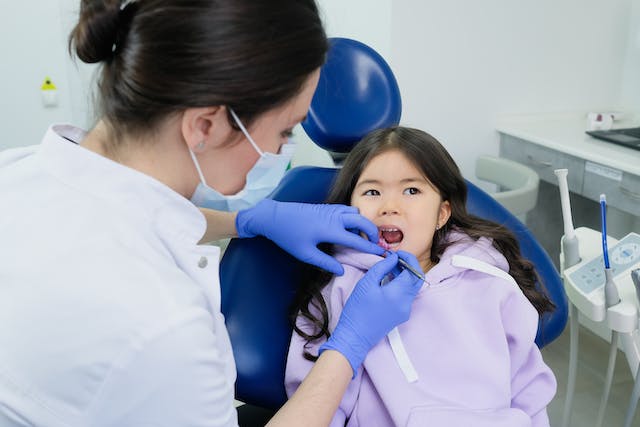As parents, we constantly strive to provide the best for our children, and their dental health is no exception. The journey to a healthy, beautiful smile begins much earlier than many might think.
In this guide, we discuss the pivotal role early orthodontic assessments play in ensuring the long-term oral health and well-being of our little ones. By understanding the significance of early orthodontic check-ups, we can lay a strong foundation for our children’s oral health, paving the way for not only aesthetic benefits but also functional and preventive care
Benefits of Early Orthodontic Evaluation
Recognizing the importance of early orthodontic evaluation in a child’s life is crucial for ensuring their long-term dental health and well-being. These evaluations, typically recommended around the age of seven, are more than just routine check-ups. They are a proactive step towards identifying potential dental issues and addressing them before they become more complex. Here are six key benefits of early orthodontic evaluations:
1. Early Detection of Dental Issues
An early orthodontic evaluation allows for the prompt detection of dental problems that might not be visible to the untrained eye. Issues like jaw growth irregularities, crowding, or bite misalignments can be identified before they become more pronounced and complex. This proactive approach not only simplifies treatment but can also prevent the development of more severe dental issues later in life. Early detection often means less invasive and more effective treatments, setting the stage for healthier dental development.
2. Guidance for Jaw Growth
One of the key benefits of early evaluation is the ability to guide jaw growth effectively. Orthodontists can identify and address growth-related issues such as underbites, overbites, and crossbites in their early stages. By intervening at a younger age, orthodontists can utilize various appliances to guide the jaw’s growth, leading to better alignment and function. This approach can reduce the need for more complex orthodontic procedures or surgeries in the future.
3. Correction of Harmful Oral Habits
Children often develop habits like thumb sucking, tongue thrusting, or prolonged use of a pacifier, which can adversely affect their dental alignment and oral health. Early orthodontic evaluations can help in identifying these habits and mitigating their impact. Orthodontists can recommend strategies or appliances to discourage these habits, promoting healthier dental development and preventing future orthodontic issues.
4. Improved Aesthetics and Self-Esteem
Early orthodontic treatment can significantly enhance a child’s appearance by correcting misaligned teeth or jaw discrepancies. This improvement in aesthetics often translates into boosted self-esteem and confidence for children, especially during their formative years. A straighter, more appealing smile can positively impact a child’s social interactions and self-image, contributing to their overall well-being.
Recommended reading: How I Maintain Work-life Balance as a Dentist Mom
5. Easier Maintenance and Better Oral Hygiene
Misaligned teeth can make brushing and flossing more challenging, leading to an increased risk of tooth decay and gum disease. Early orthodontic evaluations and treatments can help in aligning teeth properly, making daily oral hygiene easier and more effective. This not only promotes better dental health in the short term but also instills good oral care habits that can last a lifetime.
6. Preparation for Future Dental Development
An early evaluation provides a roadmap for what to expect in a child’s dental development. Orthodontists can predict how permanent teeth will erupt and identify any potential issues in advance. This foresight allows for timely interventions and planning, ensuring that as children grow, their dental needs are met effectively. It also helps parents prepare for any future orthodontic treatments, both financially and mentally, making the entire process more manageable.
What You Can Expect On Your Orthodontic Visit
During your orthodontic visit, you can anticipate a thorough and informative experience. Initially, the orthodontist will conduct a detailed examination of your teeth, jaw, and oral structures, often including X-rays or digital scans to gain a comprehensive understanding of your dental alignment and bite issues. This is followed by a discussion of potential treatment options, which could range from traditional braces to innovative solutions like Invisalign, depending on your specific needs. The orthodontist will also address any concerns or questions you might have, ensuring you understand the treatment process, duration, and expected outcomes.
If you are seeking a reputable and experienced orthodontist in Capitol Hill, look no further than Kumra Orthodontics They are renowned for their commitment to patient comfort and satisfaction, utilizing the latest technologies and personalized treatment plans to ensure the best possible outcomes for every patient.
Conclusion: Early Orthodontic Evaluation for Children
The early orthodontic examination is critical in supporting good dental health in youngsters and minimizing future issues. Parents can address orthodontic difficulties proactively by seeking early care and ensuring their child’s dental health is on the correct track from the start.
Potential issues can be reduced, dental hygiene can be improved, and face development and attractiveness can be improved with timely evaluation. By emphasizing early orthodontic examination, parents may build the groundwork for their children’s healthy smiles and overall well-being, preparing them for a lifetime of dental health and confidence.




